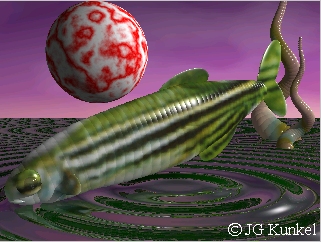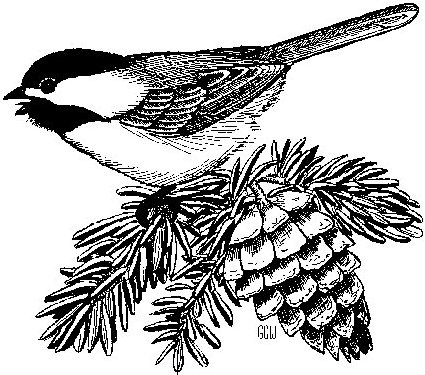Biology Establishes Learning Goals
In addition to acquisition of facts and concepts, Biology
undergraduate majors should also acquire skills and perspectives relevant to
the study of biology. The learning goals described here not only prepare
students for a variety of career paths, but also provide tools for
life-long learning in the rapidly evolving world of biological sciences.
The following skills and perspectives are necessary for biology graduates.
Skills
(1) observing and describing nature accurately,
(2) constructing logical arguments in biology,
(3) critiquing logical arguments in biology,
(4) communicating ideas and arguments effectively, orally and in writing,
(5) working effectively in a team,
(6) applying problem-solving to learning,
(7) applying quantitative reasoning to biological questions.
Perspectives
(1) appreciating that learning changes "how one thinks" as well as "what one knows",
(2) appreciating self-motivated, curiosity-driven learning,
(3) approaching novel problems with flexibility, creativity, and confidence,
(4) appreciating the interconnectedness of knowledge,
(5) appreciating that the pursuit of science can be exciting and fulfilling,
(6) acquiring confidence in oneself as a college-trained biologist,
(7) appreciating the diversity of living things and the diversity of approaches used to study them,
(8) appreciating the impact of biological science on the environment and society.
These learning goals emphasize the overriding importance of skills and
perspectives, and imply the secondary nature of the knowledge base.
Indeed, many
fields in biology advance so rapidly that a curriculum based primarily
on factual content is outdated within a short period; in contrast,
skills relating to the scientific method, logical reasoning, problem solving,
communication, and information sources, have an indefinite life span.
At a recent end-of-year awards ceremony, Dean Linda Slakey
pointed to the Biology Department's learning goals as a
model by which other departments' curricula might be refreshed.
|
 You may be surprised by the organism that in recent years has become
one of the hottest topics of biological research - the zebra danio or
Danio
rerio of the scientific literature. Those of you who have maintained
a fish tank as a hobby, or just for the sake of having 'easy' pets, will
attest to how easy it is to breed zebrafish. Ease of breeding is a major
reason why the field of developmental genetics has chosen the zebrafish as its
premier 'model system' for the study of vertebrate development. Mus
musculus move over, zebra danio is here!
You may be surprised by the organism that in recent years has become
one of the hottest topics of biological research - the zebra danio or
Danio
rerio of the scientific literature. Those of you who have maintained
a fish tank as a hobby, or just for the sake of having 'easy' pets, will
attest to how easy it is to breed zebrafish. Ease of breeding is a major
reason why the field of developmental genetics has chosen the zebrafish as its
premier 'model system' for the study of vertebrate development. Mus
musculus move over, zebra danio is here!

The Biology Department
is fortunate to have recruited to its faculty one of the world's
expert zebrafish breeders and investigators,
Dr.
Rolf Karlstrom.
Rolf has established a zebrafish breeding facility
in the Biology Department at UMass Amherst and is developing his research
projects around that resource. Besides his research on the nervous
system of the zebrafish, Professor Karlstrom is widely known for his motion
pictures of zebrafish embryogenesis. An excerpt of that process
can be viewed by visiting Rolf's web site, URL:
http://www.bio.umass.edu/biology/karlstrom/karlstrom.mov. The objective
of the superb cinematography is to enable one to be so thoroughly versed
with development of the zebrafish that any deviations from the usual pattern
will be immediately obvious. Rolf's zebrafish cinematography was
featured in a "Nature" segment on PBS this spring.
A measure of local respect has already been gained for the zebrafish.
The investigators of the Five College area
who use Drosophila as their experimental organism have
renamed their Flyclub the "Flyfishing Journal Club".
This group holds intellectually stimulating weekly meetings to discuss
the latest research in neurobiology, genetics and development of Drosophila
and now the zebrafish. The meetings attract undergraduate and graduate
students, postdocs, and faculty.
|
|
 Chairman
Chairman
Woodcock's
Corner
The 1999/2000 academic year has been remarkably busy in the Biology Department,
and very successful in many respects. A major event was the Academic Quality
Assessment and Development (AQAD) review mandated by the
trustees for all UMass programs on a seven year cycle.
We were a
guinea pig department, in the first round of reviews. The
assembled self-assessment document was two-inches thick, and was sent to four
distinguished biologists at peer institutions in the USA.
This March the external review
|
panel visited for two days of intensive meetings with students,
faculty and administrators. The reviewers report was a strong
vindication of the strength of the department, and its crucial need for more
faculty to balance the huge increase in student interest. Here are a few
excerpts from that report:
"The AQAD review team was simply overwhelmed by the enthusiasm and
commitment that the Biology faculty have throughout their ranks for teaching
at the undergraduate level" ...
"Undergraduates respond to this special commitment on the part of the faculty
in a very positive way." ...
"The excellent attitude by the
|
entire Department should not be taken for granted and should not
be squandered." ... "A minimum of
one new faculty must he hired each year for the foreseeable future
... "Department members need to be acknowledged for their outstanding
achievements, ... to be assured that the University recognizes the centrality
of basic biology in the mission of the University, and to have the University
take whatever steps are necessary to adequately support the Biology Department".
For the text of our self-assessment or the full external review,
e-mail chair@bio.umass.edu.
The process now moves to the Dean and Provost and ultimately to the
President and trustees. We must make sure the
administration is aware of the recommendations of
|
the report, and look forward to a stronger level of support for our work.
Several Biology faculty were recognized for their extraordinary
contributions in teaching, research, and advising:
Elizabeth Connor, College Outstanding Teacher Award ('99);
Lawrence Schwartz, Samuel F. Conti Faculty Fellowship ('99)
and Distinguished Faculty Lecture ('99);
William Bemis, Samuel F. Conti Faculty Fellowship ('00);
Bruce Byers, Outstanding Academic Advisor of the Year ('00);
Elsbeth Walker, Lilly Teaching Fellow ('00).
Finally, we were a recipient of an $88,000 Beckman Fellows Award for the
support of undergraduate research. It has been a challenging and
rewarding year, and, as usual, a great privilege for me to chair such an
active and committed group of students, faculty, and staff.
|





